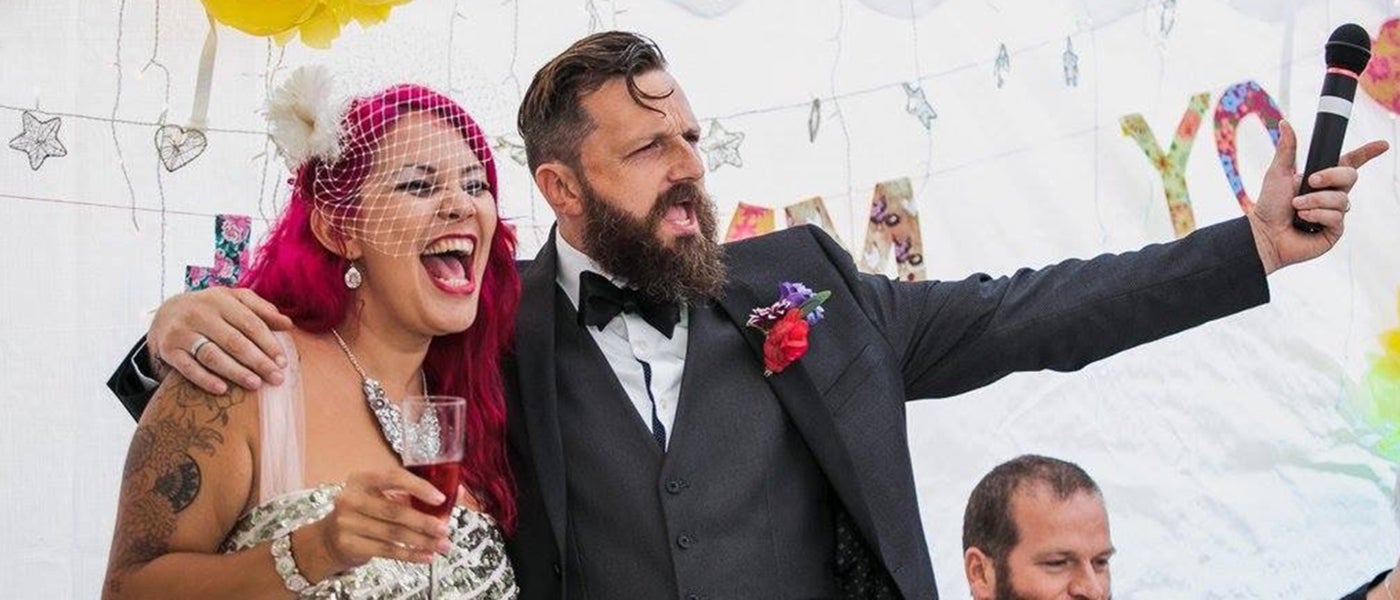- Home
- News and stories
- I saw a tiny person hidden behind a huge ostomy bag
I saw a tiny person hidden behind a huge ostomy bag
 9 April 2021
9 April 2021
I was diagnosed with ulcerative colitis in 2003 and had a colectomy and ileostomy in 2013. My blog, So Bad Ass, is about living with Inflammatory Bowel Disease and how it affects relationships, work and family life. It’s about breaking taboos, sharing experiences and improving self-esteem – as I like to say, it’s “for all you bad asses with bad asses.”
My husband, Timm, is my rock. He is always there for me, physically and emotionally. He tells me I’m beautiful when I know I’m a sweating, weeping wreck.
When I’m down he is the one person who can make me laugh. At my lowest points he has said “I love you hairy moonface”, a reference to the side effects of the steroids I was prescribed, which always makes me smile.
We’ve been on quite a journey. There have been times when I’ve shut him out and I’ve learnt that being open and honest with each other is absolutely the only way forward.
I’d never heard of ulcerative colitis before I was diagnosed in 2003 and in those early stages I was trying to understand it all. It was my bowels, I was bleeding a lot and having incontinence accidents – you don’t feel at your most attractive! It was hard for me to have an open conversation about it.
There were years of flare ups and remissions, I never knew when a flare up was coming or when it would end. There were hospital admissions and drugs that brought a long list of side effects, including insomnia, weight gain, hairiness, mood swings, anxiety and many more.
After a particularly bad hospital stay, I felt extremely depressed and low. I told Timm to leave me. I wanted him to know he had an out. I just couldn’t imagine how he would want to be with me.
But I know now that was entirely down to my own low self-esteem.
Timm was very understanding. He left me to it. I needed to understand how I was feeling myself before we could talk about it. But I think he felt a bit pushed out.
Being open and honest
He was thinking it was him and I was thinking it’s all me. It was really important for us to just be open and discuss it. He let me know that whatever happens we are going to be together. And I explained that there are times when I feel like I don’t want people to be close to me.
In September 2013, I had a sub total colectomy and end ileostomy. I now have no large bowel and for a year lived with a stoma and an ostomy bag to collect all my waste. I now have an internal pouch. Although I no longer have the external bag, I do need to go to the toilet often which can be challenging.
So that was another big thing to overcome – having an ostomy bag filled with poo in the bedroom. I offered to sleep in the spare room, but Timm wouldn’t have any of it. He flipped it around and said: “How could you believe I wouldn’t want to be intimate with you? Would you think that if it was the other way round?”
At first, I used to try to hide my stomach and wear longer clothes. But eventually I just couldn’t be bothered; it was taking up too much headspace. Going to bed, I’d think about how I should cover up. My husband said every time I was pulling my vest down, he thought she’s not enjoying being with me. So getting over myself has made everything much better.
Feeling sexy
If you look for pictures of people with ostomy bags you find images of old ladies in hospital beds. I looked at them and they frightened me, and when I looked in the mirror I saw a tiny person hidden behind a huge ostomy bag.
My husband’s a super-talented photographer so it felt completely natural for me to confront issues of body confidence through imagery. I knew the person I was before, under my scars, dressings and emotional pain, was in there somewhere and the camera helped me find myself again. In the photographs, I saw me and a tiny bag.
The 1950s pin-up style shoot we did, ended up going viral and I had some really positive feedback from regular readers of my blog and total strangers.
But there were a few comments about sexualising disability and I wondered if I was guilty of that? The short answer is f*ck yeah and why not! My sexuality, my femininity and the person I am didn’t get removed along with my colon.
But I think there is a wider point about how disability is seen in society and also how women are viewed in society.
I wouldn’t say I sexualise my disability, I would say I normalise it. I show photographs from every part of my life, hanging out with the kids, with my husband, my mum, in gym gear, at the beach. And I show all parts of my life because my condition and my disability do not change all those parts of me.
 9 April 2021
9 April 2021





